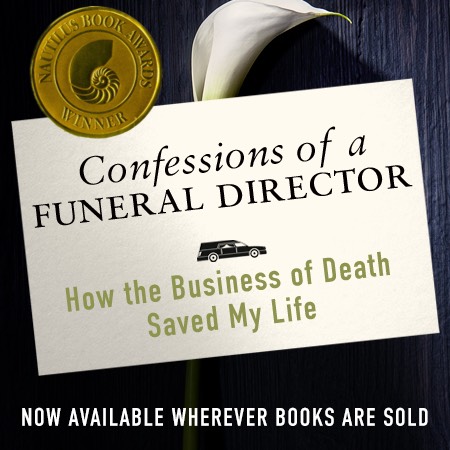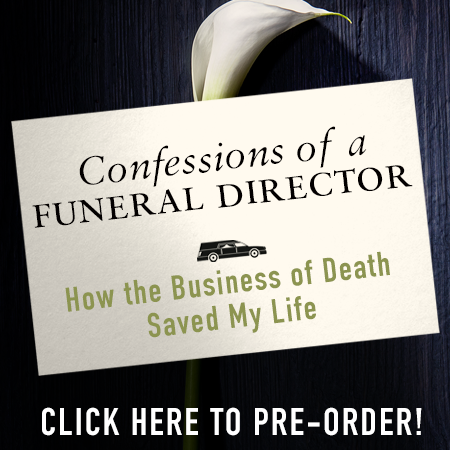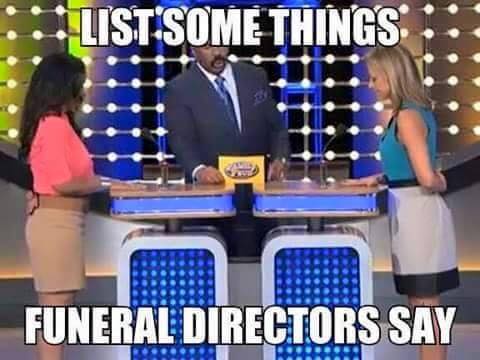Funeral Directing
10 Ways Working in Death Care Affects Me as a Parent
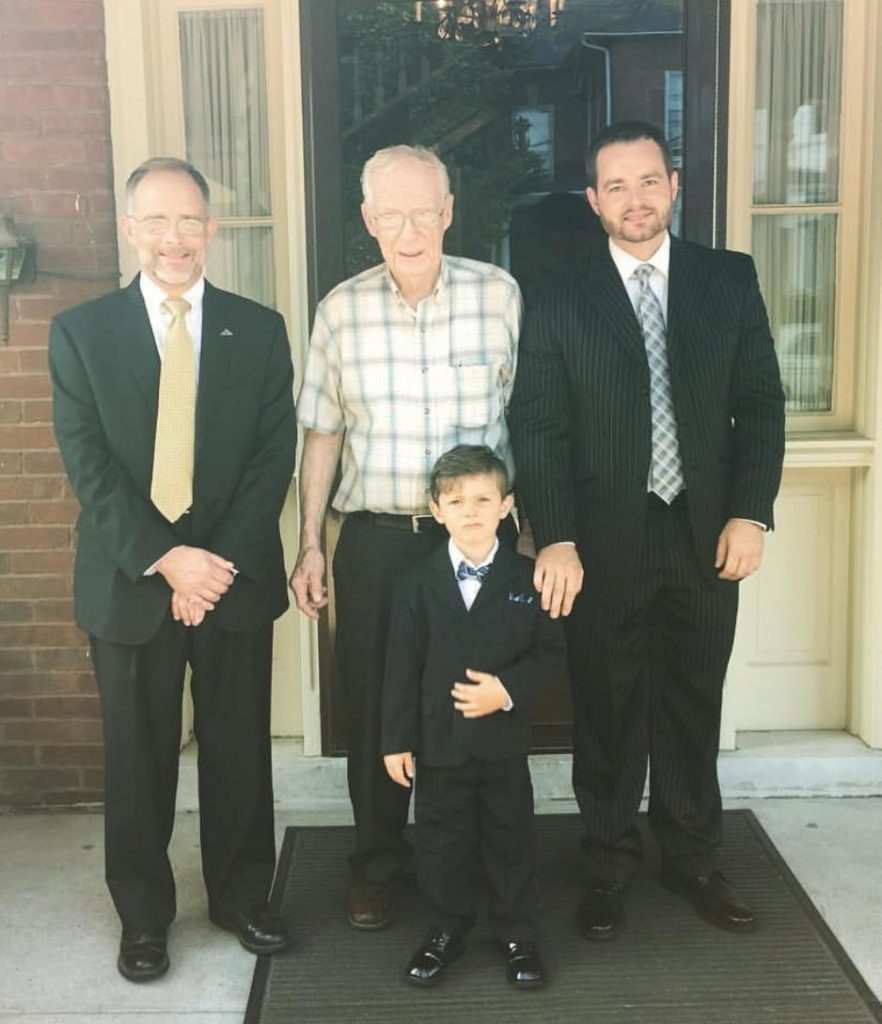 Bad Table Manner Teacher
Bad Table Manner Teacher
It was passed down to me by my father, and down to him from his father. When you work with death, you talk about death, even around dinner. That’s all fine and good if it stays in-house, but when Jeremiah goes on his first date and starts rattling off what his dad does for a living, it might hurt his chances for a second date.
More Cautious
“Remember to wear your bicycle helmet because I buried a kid that didn’t!”
“No, that seat belt needs to be across your chest. I don’t want you to be launched through the windshield like Billy Johnson.”
“There’s a reason I want you to chew your food. Because if you’re ever eating alone and you choke, well ….”
“Never underestimate the power of an angry beaver.”
It’s easier to switch off work
You think it’d be the opposite. I mean, going from wrestling a dead body onto an embalming table to wrestling your son an hour later is a little outside the norm.. For me, being around death helps me value every moment I get with Jeremiah. Death makes me love his life.
Funeral Suits. The children of funeral directors have funeral suits.
Because we’re not afraid to send our kids to funerals. And we also want them to look sharp doing it.
Dead Bodies are No Big Thing
I don’t remember the first time I saw a dead body, and neither will Jeremiah … because they’ve just been a natural part of our lives since as long as we can remember.
Dead Children are a Bigger Thing
Any death care worker has seen their share of the unspeakable. It affects all of us. Whenever we have to serve a family that lost a child, everyone at the funeral home is moody, on edge and generally not pleasant. It’s hard enough as is, but when you see YOUR child in the face of the little one in your prep room, it drives it home even deeper. This is the stuff of literal nightmares.
LOVE YOUR ELDERS
It’s probably because I model it to him. If you work in the funeral business, you naturally work with people who are older. As kids, we’re taught to respect your elders. As we age, that respect turns to love because the older they come, the better they are (for the most part). Jeremiah sees my love (and respect) for the elderly and he mimics it. I love that.
Spoiler Spoiler
If I’ve seen a movie or show before someone else, I usually make the spoiler joke that “everyone dies at the end” because I’m a funeral director it’s a nice double entendre. But, in Infinity Wars, that joke is only half true. Whoops. Sorry.
Don’t you hate spoilers? Working in the funeral business is one big spoiler because the dead love to remind you about the ending of your story.
Enter children with all their life, all their hope, trust, and carefree resilience. All that, all that they are, has a way of spoiling the power of the spoiler. Because some narratives are so good, you can thoroughly enjoy the story even when you know how it ends.
Missing Events
Like every parent, we try our best to be at their sports games and stuff happens. When we’re on call, nothing is sacred, including time with the kids.
Pursue your dreams, kid and I’ll celebrate your every step.
We’ve all been hammered with these little truisms like, “live so you don’t have regrets on your deathbed”, and “live like you’re dying”, and, #YOLO. For those of us who are close to death, truisms have been hammered home much deeper.
Often, though, we use those truisms for ourselves, and our dreams, and our careers, but the profound thing that death has taught me is that the best life I can live is when I’m celebrating someone else. That someone else, for me, is Jeremiah.
*****
If you like my writing, consider buying my 2017 Nautilus Book Award Gold Winner, Confession of a Funeral Director (click the image to go to the Amazon page):
10 Things about Funeral Director’s Love Lives
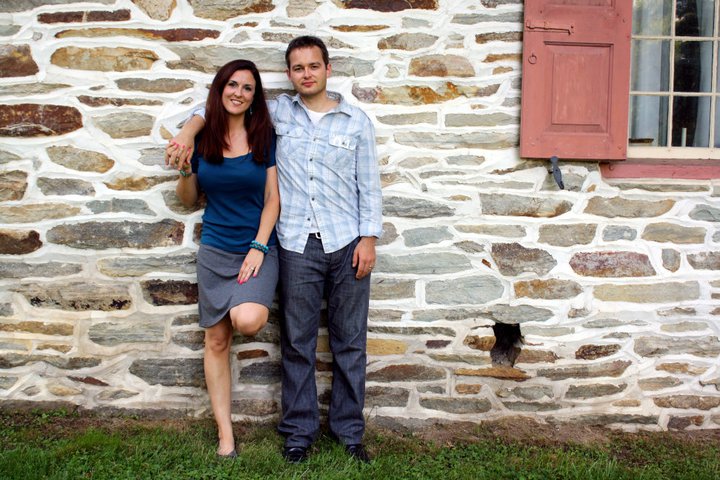
I know what you’re thinking. “Caleb, you’re reaching on this one. You’re just looking to write a post that lets you pluck the low hanging jokes, like ‘Funeral directors can make you stiff’, etc.” You got me there. I tend to pick the easy jokes, but bear with me because this is a thing, a thing that NOBODY TALKS ABOUT.
Because when you work in a profession that sees nearly 80% of their workforce burn out before they hit the five-year mark of employment, you can bet that their love lives are a little different than most.
One. Commitment confusion.
This job asks us to marry it. It asks for us in sickness and in health, night and day, in good times and bad. Death is always asking, always needy, always calling and texting. It’s tempting too, because when we can fulfill the needs of death, it can create a kind of co-dependent relationship where we fulfill the needs of death and death fulfills our needs of feeling important. When death is so demanding, all other relationships become mistresses.
Two. Good back rubs.
It’s very true. We give very good backrubs. And the fact that we give good backrubs has nothing to do with the fact that we’re constantly massaging the dead to make sure the embalming fluid get’s evenly distributed throughout the decedent’s corpse.
Three. Bi-polar Sex Drive.
The Jekyll and Hyde Syndrome also affects our physical relationships with our partners. This is real. And surprisingly, the show Six Feet Under captured this well in the complexity of their characters. For all of us, our sex drive can be seemingly unpredictable. For those who work around trauma, death, and grief, those drives seem to go to utter extremes. Because sex — for some — is a natural stress diffuser, and when we’re under professional stress on a constant basis, our desire for that physical relief can — at times — be overwhelmingly strong. Other times, that stress is so overwhelming we don’t even want to be touched.
Four. General Audio Illusions
Funeral Director Dude (while having sex): Oh, Laurel! I love you so much!
Laurel: WHO THE HELL IS ‘YANNY?!’
I suppose we all suffer from that problem.
Five. On Children
After a bad day at work: “I don’t think we should have children. This world is too dark and scary.”
After a good day at work: “WE SHOULD HAVE CHILDREN RIGHT NOW!!!”
Six. Transference
Transference is a psychological term that funeral directors have some practical experience dealing with. Some people we deal with have major problems and baggage that gets fanned to flame by grief and bereavement. Often times, they take their problems, their anger, their frustration and instead of dealing with their grief and bereavement, they take it out on us. If you’ve been in the business long enough, you know not to take it personally, but it’s nonetheless difficult to take a capricious verbal lashing for no apparent reason other than transference.
But here’s how it affects relationships: funeral directors too often do the same, especially to their significant others. See, generally, we take out our problems on those we see as our equals or those we see as inferior. While I hope nobody is in a relationship with someone who views them as inferior, most of us tend to be in relationships with people we perceive as equals. So that stress, baggage, angst that we pick up in the funeral business often gets taken out on those closest to us in our personal lives.
Seven. Bringing our Work Home
Most jobs can be left at work. But there’s so much personal stuff with the funeral business, so much stuff that affects US, that it’s almost impossible to leave things there. It also doesn’t help that there are still many family-run funeral homes that literally have their home on the second floor of the funeral home. Work is literally one flight of steps away from everything.
Eight. Flowers.
We’ll always give you flowers. Endless flowers. Forever. Mind you, they’re likely left over funeral flowers, but still.
Nine. The Chaotic Schedule
If funeral directors are going to have love lives at all, there has to be an understanding: when we’re on call, nothing is safe and nothing is sacred. We could be at a fancy dinner and our phone rings and we have to go. Watching Netflix, phone rings and we have to go. Sex, phone rings, go quickly then go.
Ten. The Jekyll and Hyde Syndrome.
Okay. I’m making this syndrome up. Nevertheless, it describes how the funeral business makes you feel. Here’s a brief 10-day snapshot of how quickly certain deaths and certain funerals can change us:
DAY 1: We come home from the funeral home and we’re serious and philosophical, contemplating the meaning of life. “Babe, I think we need to pursue our dreams and hug each other more often BECAUSE WE ONLY GOT ONE LIFE!”
DAY 2: The next day, we come home after having dealt with some tragic death and we’re like, “Babe, life’s meaningless … maybe we should just get drunk every night.”
DAY 3: “Lovie, I think we need to up our commitment to God and the church because this family I served today … there’s so much good in faith!”
DAY 4: After a bad experience with a pastor, “Lovie, let me tell you: religion is horrible. These people. Ugh. So. Much. Fake.”
DAY 5: We want to tell you everything, from the removal to the embalming, to the sights and the sounds. We chatterbox on and on for hours about our day.
DAY 6: “Snuggie Woogems, I DON’T WANT TO TALK. JUST LEAVE ME ALONE.”
DAY 7: “Jelly Bean, I think we should be saving more for retirement ’cause I met with this older couple who have nothing.”
DAY 8: After getting a death call for a young person: “Jelly Bean, let’s spend it all. What makes you happy? Shoes? Let’s buy all the shoes … because we could die tomorrow.”
DAY 9: “I’m on a diet today, Chipmunk. I want to age as best as I can. Quality of life, Chipmunk. Quality of life. Also, we need to join the gym.”
DAY 10: *Stress eats an entire pizza and sleeps for 14 hours*
DAY 11: “I know my job’s hard, Love Muffin, but at least we have an income.”
DAY 12: After a 12 hour day on what was supposed to be a day off, “I’m quitting, Love Muffin. Time to downsize.”
One day, we’re one person and the next day we’re a completely different person because when you attend to the dead and their funerals on a daily basis, the lives of the people you serve tend to change you, shape you, challenge, stretch, anger, encourage and confuse you all at once, all the while confusing your partner to no end. You just have to hope your partner loves your chaos.
*****
If you like my writing, consider buying my 2017 Nautilus Book Award Gold Winner, Confession of a Funeral Director (click the image to go to the Amazon page):
101 Things I’ve Done as a Funeral Director
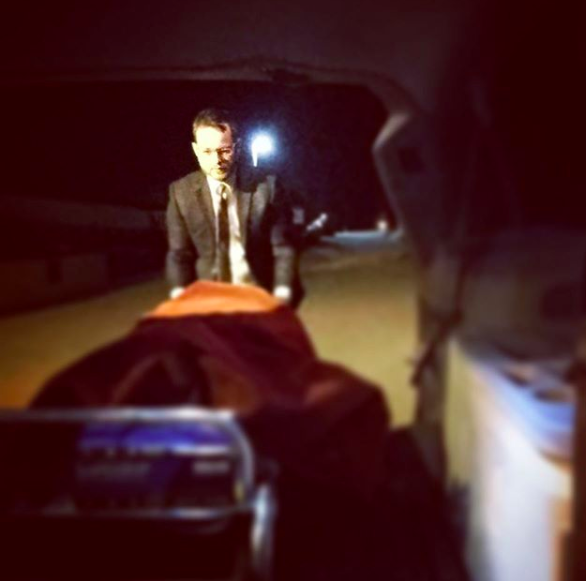
Note: there’s no body on the stretcher.
When you’re a funeral director, your primary concern is people: both the dead kind and the living. And when you serve people, you do some weird things to meet that end. Death is all wrapped up in life, in the mundane, the messy, the maddening parts of living. Since, death is wrapped in life, it’d only make sense that those of us in death care do a bunch of things. Here are 101 things I’ve done.
- Helped change a random baby’s diaper at a viewing.
- Removed a dead person’s adult diaper.
- Warmed up a bottle of baby formula.
- Wiped a deceased’s person’s ass.
- Cleaned the funeral home’s toilets
- Cleaned the morgue floor.
- Cleaned the blood of the deceased off of his bathroom floor.
- Shoveled snow at the funeral home
- Shoveled a path through the snow back to the deceased’s trailer.
- Gave the deceased’s German Shepherd some water while it sat in the visitation line at the funeral home.
- Comforted a dog as we carted his friend/owner out of the house.
- Comforted a family with some coffee from Dunkin Donuts.
- Made a McDonald’s run for a family during a funeral.
- Parked cars in a funeral procession line.
- Fixed a car’s door while it sat in a procession line.
- Washed a car in the procession line.
- Washed the hearse a thousand times.
- Washed vomit out the back of the removal van.
- Washed blood out the back of the removal van.
- Carried a dead person down multiple flights of steps.
- Carried a dead person up from a basement.
- Carried a dead body in rigor mortis fireman-style off of a toilet.
- Embalmed old people
- Embalmed young people.
- Embalmed my grandfather.
- Embalmed a motorcycle accident victim.
- A burn victim.
- Suicides of all varieties.
- A person run over by a train.
- Drove the deceased’s family to a train station.
- Drove the deceased’s family to the airport.
- Chauffeured the deceased’s family to a cemetery.
- Chauffeured the deceased’s family to a bar.
- Pushed people in wheelchairs into the funeral home, through cemeteries, and out of the way at nursing homes.
- Helped carry crying people’s purses.
- Helped carry crying people’s water.
- Helped carry crying people.
- Once used smelling salts on someone who fainted at a graveside (wouldn’t do that again).
- Once fall into a grave.
- Once helped someone out of a grave.
- Helped lower numerous caskets into graves.
- Helped clean up the tent and lowering devices at the grave.
- Got cemetery dirt on my suit.
- Got blood on my suit.
- Got vomit from a dead body on my suit.
- Got vomit from a baby I was holding at a viewing on my suit.
- Ripped my suit so far that my underwear was showing.
- Sweated in my suit.
- Nearly froze in my suit.
- Dressed many a man in their suits.
- Dressed many a woman in their burial clothing.
- Put a teddy bear in the casket with the deceased.
- Helped kids put cards in the deceased’s casket
- Watched people put whiskey in a deceased’s casket.
- Watched people put a dime bag of pot in a deceased’s casket.
- Watched people jump into a deceased’s casket.
- Helped pull them out of the deceased’s casket.
- I’ve closed the lid of a casket.
- I’ve closed the mouth of many a deceased.
- I’ve closed the eyes of the deceased.
- I’ve closed autopsy Y incisions.
- Embalmed autopsied bodies.
- Seen all the insides of an autopsied body.
- I’ve held a brain.
- Held a heart.
- I’ve held the hand of a grieving mother.
- Listened to the cries of a grieving mother.
- Listened to the laughter of children at funerals.
- Performed magic tricks for children at viewings.
- Played hide-and-go seek with children at viewings.
- Played hide-and-go seek as a kid in the casket showroom
- Worked night viewings.
- Gone on death calls in the middle of the night.
- Gone on death calls in the middle of a snow storm.
- Used my Subaru Forester for a death call during a snow storm (the stretcher just fits).
- Used an old Land Rover for a death call during a snow storm.
- Negotiated with Insurance companies on behalf of families.
- Negotiated with doctors on behalf of families.
- Negotiated between family factions during funeral arrangements.
- Stopped fights at funerals.
- Played bouncer at funerals when families don’t want a certain person to attend.
- Removed people from funerals.
- Removed catheters.
- Removed pacemakers.
- Forgot to remove pacemakers that consequently exploded in the crematory.
- Taken pictures of tattoos before the person was cremated.
- Made picture slideshows for families.
- Restored and photoshopped photos for obituary notices.
- Wrote thousands of obituaries.
- Filled in as a makeshift altar boy.
- Helped fold a flag at a graveside service.
- Said a prayer at a graveside service when the pastor didn’t show.
- I’ve been the soundman at churches.
- Been the DJ at viewings.
- Helped men at viewings tie their ties.
- Joked about tying dead people’s shoe strings.
- Joked with families to help relieve the tension.
- Hugged thousands of people to help relieve the tension.
- Listened to people to help relieve their grief.
- Allowed death to shape my story.
- Wrote a book about it all.
20 Things Funeral Directors Say
This post is collected from the Confessions of a Funeral Director Facebook community:
One. Two.
Two. Three.
Three. Four.
Four. Five.
Five. Six.
Six. Seven.
Seven. Eight.
Eight. Nine.
Nine. Ten
Ten
 Eleven.
Eleven. Twelve.
Twelve. Thirteen.
Thirteen. Fourteen
Fourteen Fifteen.
Fifteen. Sixteen.
Sixteen. Seventeen.
Seventeen. Eighteen.
Eighteen. Nineteen.
Nineteen.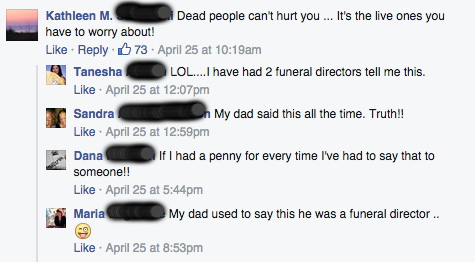 Twenty.
Twenty.
If you’re interested in the life of a funeral director, here’s my story, told with humor, spirituality, and transparency.
10 Ways the Funeral Industry Has Failed
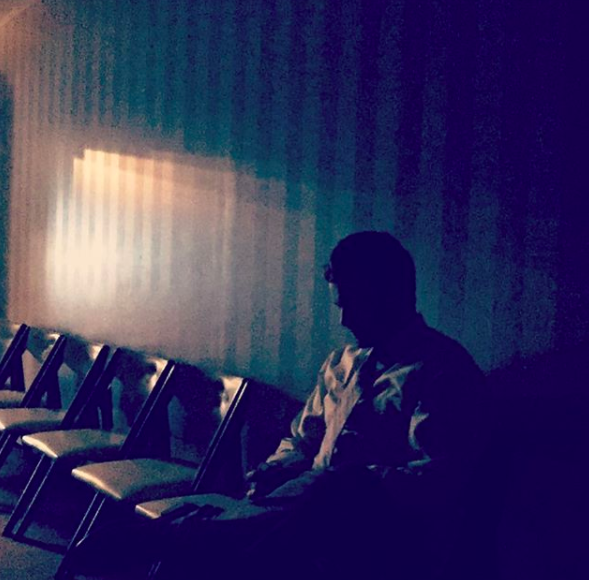
Don’t worry, I’m going to write a post about the ways the funeral industry has succeeded. But for now, here are ten ways we’ve failed.
One. Disconnected from Community
This is where things start to go horribly wrong. If you don’t have a personal investment in the community, if you don’t love the customers you work for, if you don’t live around them, send your kids to the same schools, shop at the same places, you lose the accountability of love and connection. Once that accountability is lost, death care ethics are on a much more slippery slope. This is why — for the most part — local, privately owned funeral homes are more likely to retain their good name, while large, corporate funeral homes tend to be slightly disconnected and slightly more likely to see this as primarily a business.
Two. Bad at receiving criticism
We’re notoriously bad at receiving criticism. To be fair, nobody is good at it. I mean, who likes to be told that we’re a bunch of racketeers over and over and over again? I know I don’t. Unfortunately, some of that criticism is true! We’re good at listening to market changes, in fact, our funeral director magazines are packed with advice on how we can respond to our customer’s wishes, but when constructive criticism comes from a customer, most of us are too biggety to listen.
Three. Intentionally Kept our Practices Hidden
God forbid we tell you what we do with your loved one. God forbid we publically write about what we do with your loved one. God forbid we blog about it (GASP!!!).
Four. Pushed Embalming Too Hard
Embalming is THE American Way of Death, or at least it was The American Way of Death. Yes, Jessica Mitford popularized that term with her book that holds the same title, but it was funeral directors who coined the term. The term was coined in a response to criticism from religious circles that claimed embalming was a pagan practice (the Egyptians did it for religious, but not Christian reasons). In response, funeral directors said, “No, embalming isn’t pagan, IT’S AMERICAN!” But that America was the America of nearly 80 years ago. America isn’t the same, but funeral directors still want it to be. MAEA! Make America Embalmed Again!
Five. No Support System for Funeral Directors
This is on two levels: funeral directing — like many professions — started as a trade, where the apprentices were trained by masters. Most states (all states?) still require a year of apprenticeship in order to gain licensure, but that apprenticeship needs to continue long after we become licensed. We need mentors to walk us through this trade. Two: we need support groups of some kind that can catch us when we’re falling from the burnout and compassion fatigue that too often comes with this line of work. Currently, most of us have neither.
Six. Too Often Erred on the Side of Business
We should be erring on the side of service. This perspective changes the way we approach money, and it changes the way we approach people.
Seven. Narcissism Checks
We’re called to be directors, to display confidence, knowledge, authority, and strength during people’s weakest moments. But this environment that asks us to lead can too often enable us to self-enhance. We talk over our heads, project authority in situations that are best left to the family and tense up in disdain whenever we’re questioned. There needs to be better checks and balances in place to keep us from sliding towards narcissism.
Eight. Too Much Professionalism
There’s not wrong with being professional. In fact, funeral directors should embody respect, courtesy, and kindness. But, professionalism says something more. It makes a distinction between those who are the professionals and those who are amateurs. Let’s be very clear about one thing: a funeral director’s education, a funeral director’s experience makes them good at helping families with their funerals, but LOVE, and only love, makes someone the best of professionals when dealing with their own deceased. That is, it’s love, and not foremost education and experience, that gives you authority with a dead loved one. In an attempt to embody professionalism, we funeral directors have stolen death care from the true professionals.
Nine. Like Most Industries, WE NEED MORE WOMEN
Amen and amen.
Ten. At times, we’ve failed you
Most of the women and men in the funeral profession are good, smart and service-oriented. But some of us aren’t. And even the good ones can fall into the traps of this business. For that, we’re sorry. We’re sorry if we’ve failed you. We can do better. We will do better.
If you’d like a personal, transparent view of what it’s like to be in the funeral profession, please consider supporting my writing by pre-ordering my book:
